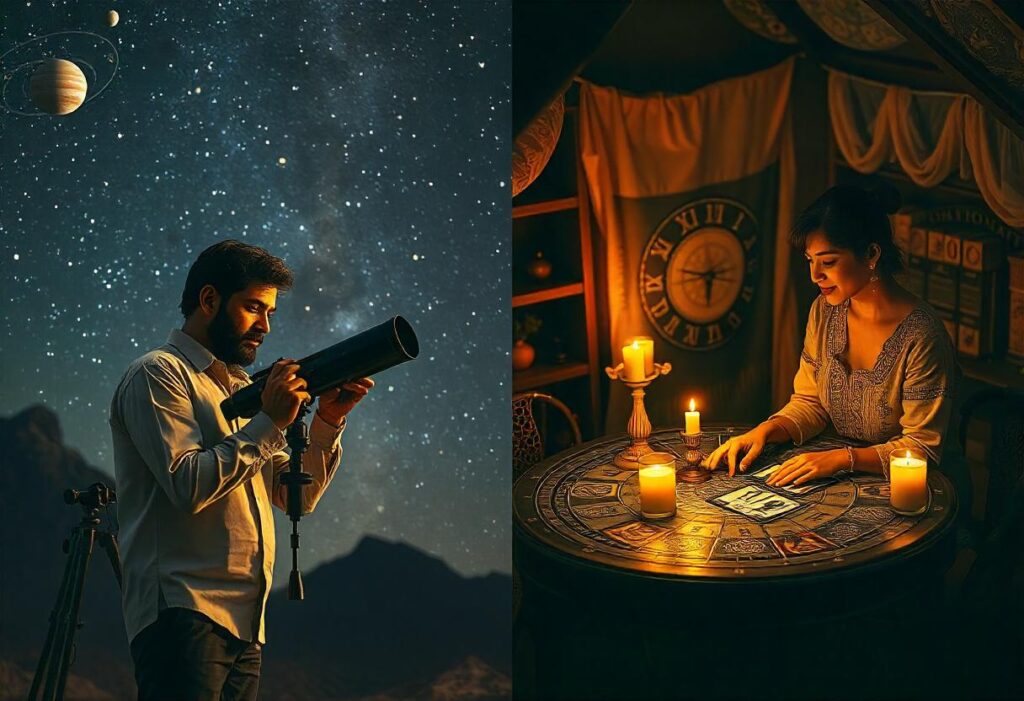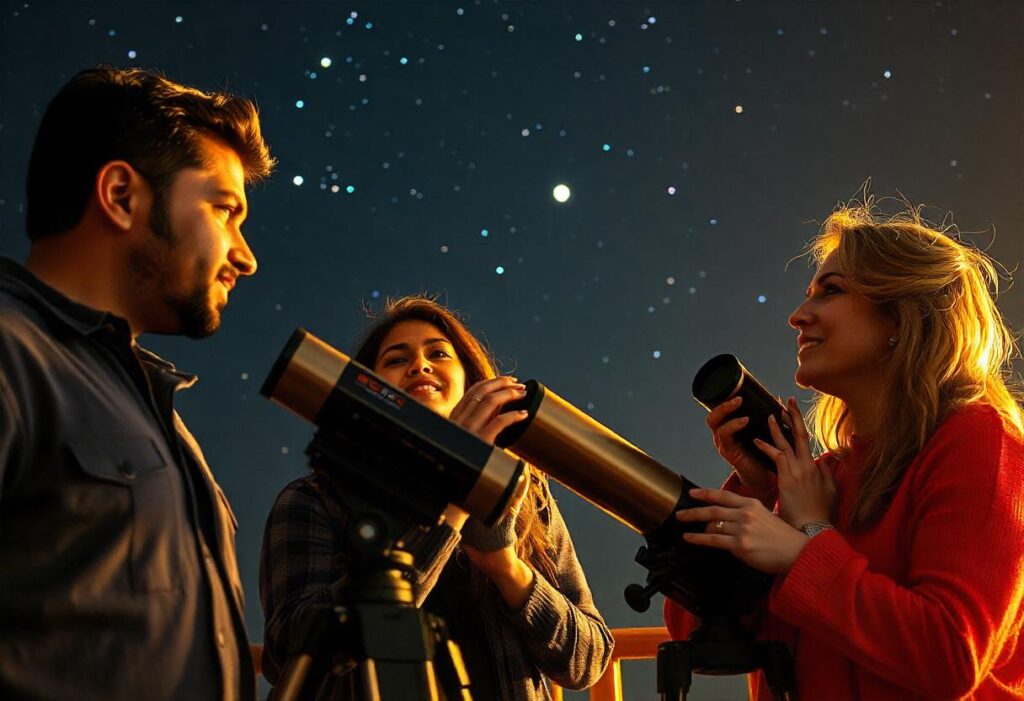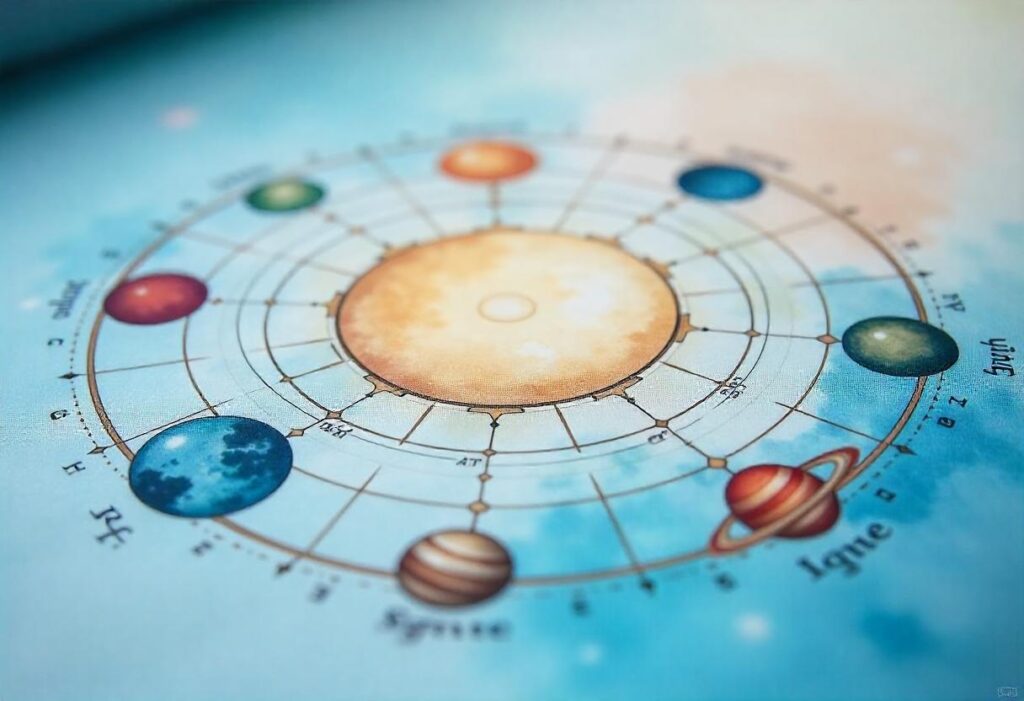Astrology vs Astronomy is a Amazing and often confusing topic. While both fields study celestial bodies, their purpose, methods, and beliefs are vastly different. Whether you’re curious about the stars and planets or want to understand human behavior through zodiac signs, it’s important to recognize the key differences between astrology and astronomy. This article will provide an in-depth look at the key differences, helping you understand the contrast between astrology vs astronomy to astronomy for beginners.
Introduction: Astrology vs Astronomy – The Basics

When you think of the stars, the first thought might be about astrology. However, astrology vs astronomy is an important distinction to make. Astrology is a belief system that connects celestial events to human affairs, while astronomy is a science focused on studying celestial bodies and the universe.
What is Astrology?
Astrology is based on the belief that celestial bodies, like the stars and planets, influence human lives and natural events. The astrology vs astronomy debate highlights the major differences between these two fields, with astrology being more about predictions and interpretations.
Key Features of Astrology:

- Zodiac Signs: Astrology divides the sky into twelve signs, such as Aries and Taurus. These are believed to govern people’s lives and personalities.
- Horoscopes: Astrologers create daily, weekly, or yearly forecasts based on zodiac signs and planetary positions.
- Planetary Influence: Astrology suggests that the planets and stars affect various life events like career, health, and relationships.
- No Scientific Backing: Unlike astronomy, astrology doesn’t rely on scientific methods and is viewed as a unscientific.
What is Astronomy?

Astronomy, often confused with astrology, is the scientific study of celestial objects, such as stars, planets, and galaxies. Unlike astrology, which focuses on human affairs, astronomy deals with the universe and its phenomena, using observational tools and scientific methods.
Key Features of Astronomy:
- Scientific Foundations: Astronomy is rooted in science, relying on data, research, and evidence to study the universe.
- Cosmology: A subfield of astronomy, cosmology studies the origins, structure, and fate of the universe.
- Astrophysics: This branch of astronomy focuses on the physical properties and behaviors of celestial bodies.
- Astronomy for Beginners: For those interested in exploring the universe, astronomy for beginners provides an introduction to topics like star formation, galaxy exploration, and space travel.
Key Differences Between Astrology vs Astronomy

Understanding the differences between astrology vs astronomy is essential to know where each field stands in terms of approach, methods, and Trust. Let’s explore these differences.
1. Purpose:
- Astrology: The goal of astrology is to interpret how celestial bodies influence human lives. It is often used for guidance in personal decisions and predictions.
- Astronomy: The purpose of astronomy is to study and understand the universe. Astronomers investigate the physical properties, behaviors, and origins of celestial bodies.
2. Scientific Basis:
- Astrology: Astrology lacks scientific validation. It is based on belief systems and does not follow the scientific method.
- Astronomy: Astronomy, unlike astrology, is a strict science that employs observation, mathematics, and physics to understand the cosmos.
3. Methods:
- Astrology: Astrologers study the positions of celestial bodies, creating horoscopes and predictions based on those positions.
- Astronomy: Astronomers use telescopes, satellites, and advanced technology to observe and analyze celestial objects.
4. History:
- Astrology: Astrology dates back thousands of years and was practiced alongside early astronomy. Ancient cultures linked celestial events to human actions.
- Astronomy: Astronomy, as a science, showed up during the medieval with key figures like Galileo and Kepler. It became a formal scientific discipline with the advent of modern technology.
How Did Astrology and Astronomy Diverge?
Historically, astrology and astronomy were part of the same field. Ancient civilizations observed the stars and planets, linking them to events on Earth. Over time, astrology vs astronomy diverged as astronomy evolved into a scientific discipline, focusing on data-driven discoveries, while astrology remained a belief system rooted in interpretation and prediction.
Astronomy for Beginners: Getting Started

If you’re new to astronomy and want to learn about the cosmos, astronomy for beginners is a great place to start. Here are some tips:
1. Start with Basic Concepts:
Learn the structure of the solar system, the types of celestial bodies, and basic space exploration concepts.
2. Use Telescopes:
Begin with simple telescopes to observe celestial objects like the moon, stars, and planets. Advanced telescopes offer clearer views of distant galaxies.
3. Online Resources:
There are a variety of apps and websites that provide astronomical data, such as NASA’s website, offering beginner resources on space exploration.
4. Join a Community:
Find local astronomy clubs to share knowledge and experiences with fellow supporters and professionals.
Why Do People Confuse Astrology vs Astronomy?

One of the reasons people confuse astrology vs astronomy is the historical overlap between both fields. In ancient times, both were interlinked, but as astronomy advanced scientifically, it left astrology as a belief system, causing them to diverge into separate domains.
Astrology Product: Kubersukh
Is Astrology Relevant in Modern Times?
Astrology continues to be popular as a form of entertainment and self-reflection. People often use astrology for daily guidance and as a fun way to predict their future. However, scientifically, astrology is not regarded as valid. If you seek a deep understanding of the universe or celestial bodies, astronomy is your best option.

Conclusion: Key Takeaways on Astrology vs Astronomy
In summary, astrology vs astronomy involves two very different approaches to understanding celestial bodies. While astrology is based on belief and seeks to connect the stars and planets to human affairs, astronomy is a science that studies the cosmos using Data from experiments. If you’re interested in learning about the universe scientifically, astronomy for beginners is the way to go.
By understanding these key Differences, you can appreciate both fields for what they offer, but it’s important to recognize that astronomy is scientifically proven, while astrology remains a belief system with no scientific backing.


